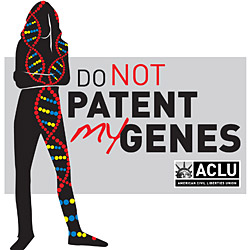
On Monday, federal district court Judge Robert Sweet made history by issuing the first ruling ever that human genes can’t be patented.
The U.S. Patent and Trademark Office (PTO) has been issuing patents on human genes for over 20 years, giving private corporations, individuals, and universities exclusive rights to those genes and to test, study, or even look at them. This is the first time a court has said that this practice is unlawful.
Late Monday afternoon, the judge issued his decision in our breast cancer gene patents lawsuit, which challenges the government’s granting of and Myriad Genetics’ control of patents on the BRCA1 and BRCA2 human genes, which are associated with breast and ovarian cancer.
The judge declared that all 15 patent claims that we challenged are invalid, based on the fact that they cover products of nature and abstract ideas. He wrote in his decision:
The resolution of these motions is based upon long recognized principles of molecular biology and genetics: DNA represents the physical embodiment of biological information, distinct in its essential characteristics from any other chemical found in nature. It is concluded that DNA’s existence in an “isolated” form alters neither this fundamental quality of DNA as it exists in the body nor the information it encodes. Therefore, the patents at issue directed to “isolated DNA” containing sequences found in nature are unsustainable as a matter of law and are deemed unpatentable subject matter under 35 U.S.C. § 101.
(You can read more about our legal arguments here and here.)
The judge ruled that Myriad’s claim — that the “isolation” of the BRCA genes from the surrounding DNA makes them into something distinct and patentable — is fundamentally flawed and nothing more than semantics:
Many, however, including scientists in the field of molecular biology and genomics, have considered this practice a “lawyer’s trick” that circumvents the prohibitions on the direct patenting of the DNA in our bodies but which, in practice, reaches the same result.
This is a huge victory for women’s health and scientific freedom. Myriad has already said that they will appeal, but if this decision is upheld, it will mean that the thousands of researchers and clinicians who have the ability to conduct BRCA testing and provide results to women, will no longer be prohibited from doing so. This could well mean that the price of this test will come down, making it accessible to many women for whom the current cost (Myriad charges over $3,000) is prohibitive. It would also mean that our six individual women plaintiffs and the thousands of other women affected by hereditary breast and ovarian cancer can more freely access critical information about their own genetics, such as getting a second opinion before taking drastic preventative measures like mastectomy or having their ovaries removed. Finally, it would mean that the PTO would change its policy and no longer issue patents on human genes.
The judge noted the significance of his decision:
The resolution of the issues presented to this Court deeply concerns breast cancer patients, medical professionals, researchers, caregivers, advocacy groups, existing gene patent holders and their investors, and those seeking to advance public health.
Because our lawsuit challenges the whole notion of gene patenting, this decision could have far-reaching effects beyond the BRCA genes. Approximately 20 percent of all human genes have been patented, including genes associated with Alzheimer's disease, muscular dystrophy, colon cancer, asthma, and many other illnesses.
This is a moment of triumph for our plaintiffs, but the fight is not over. Stay tuned, and if you haven’t already, be sure to watch a video of our plaintiffs and sign a message of support for them at www.aclu.org/brca.

